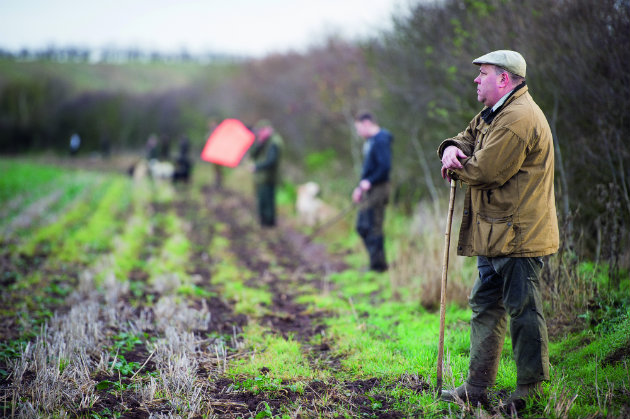How to be an ideal beater
Mike Appleby of the Honeycombe shoot assesses the season on his estate and gives his view of an ideal beater


Nothing makes the job easier for a keeper than a good team of reliable beaters
The ideal beater
Nothing makes my job easier than a good team of reliable beaters and picker-ups. In any beating team there is normally a core that know the ground better and work that bit extra to make the day a good one. Most of my beaters are locals, many seem to have been here forever. Before we started on the main pheasant days I like to take some of them out for reconnaissance, in particular on new drives so they know the lie of the land and have a mental picture of how the drive will work. Good communication is vital and I have seven radios distributed amongst them. However, it’s important when using radios to not make long-winded observations and clog up the airwaves – keep messages simple and short. If you are a first-time beater, or going beating on a new estate, I would offer the following tips.
- Make sure you arrive promptly and don’t be offended if the keeper, who sounded pleasant on the phone, appears a bit gruff.
- Keepers have a lot on their mind on a shoot day, and exchanging pleasantries when they have a 101 things to do is the last thing they need.
- Make sure you listen to the briefing in the beaters’ room and what the program for the day is.
- If the team are shooting through, remember to take your lunch and drink with you and put it in the beaters’ trailer. We provide hot drinks and food for beaters here, but it pays to bring your own on a new shoot just in case. If in doubt, ask the keeper beforehand.

Bring your own stick or flag – some shoots provide them while some will not
Equipment
Make sure you have your own stick or flag – some shoots provide them, others do not. Make sure to wear appropriate clothing, some of our beaters take great pride in their appearance and are very well turned out, which is great to see. But, waterproofs are vital on some days. It is no joy to get soaked on the first drive with a whole day ahead.
At Honeycombe we work as a team on an equal footing whether pickers-ups, beaters or stops – each is important as the rest. There can sometimes be a bit of a divide between beaters and pickers-up and if this ever arises I nip it in the bud promptly. Everyone should help everyone else. If beaters see a picker-up with 25 birds hanging off their shoulders then it makes sense, if time allows, for the beaters to take the birds to the gamecart thus freeing-up the picker-up to do some more retrieving. It will go down well for you if you take note of what is going on when beating. You might see birds breaking out of an area that you can report back to the keeper.
Look after your beaters
I like to swap roles among the beaters so that they can all do the different jobs required. This has huge advantages if you are shooting three to four days a week because some of the team may not be free every day. Being able to multi-task is very useful. I always welcome youngsters in the beating line and try to place them in between two experienced beaters, who can keep an eye on them and teach them. I also like to offer the beaters some game at the end of the day. Regarding transport for the beaters, all vehicles and trailers are serviced and checked with radio contact between the trailer and driver – in case they have to stop for any reason. It is important to look after your beaters, they are essential. We have a meal for them in the local pub at the end of the season and they come to clayshoots on the estate out of season.

Always ask a keeper when you can work your dog. Mike welcomes dogs as long as they are well-trained
Dogs
With regard to beaters’ dogs – I welcome them if they are well-trained. If you are on a new shoot ask the keeper when you can and can’t work the dog. If in doubt, keep your dog on a lead. Even a well-trained dog can give in to temptation when there are a lot of birds in front and you won’t make any friends if it runs in and flushes the lot. The dog should really not be working more than 10 yards ahead at most and you will get more respect for slipping its lead on than making a mistake. Listen to instructions after the drive is over and don’t be tempted to join in picking-up, because you will be expected to be ready to be off to the next drive straight away. A shooting day on a large estate can be fast‑paced.
Tips
- Try to keep on top of vermin and with the nights drawing in you can go out lamping without being back too late
- Distribute some game to estate workers and those who help out on the shoot
- Keep the larder clean and tidy
- Make sure your gamedealer has your shoot days in their diary
- Remember to keep dogging in. Any remaining natural food that is still around can cause birds to stray
Beating on a shoot day – the golden rules
Essential advice for beaters on a shoot day
10 must-reads about beating and picking-up on a shoot
If it’s your first time out, then your fellow beaters and pickers-up will show you the ropes. In the meantime,…
Get your gundog ready for the beating line
People often ask: “How old should my dog be before taking it into the beating line?” The truth is there…











